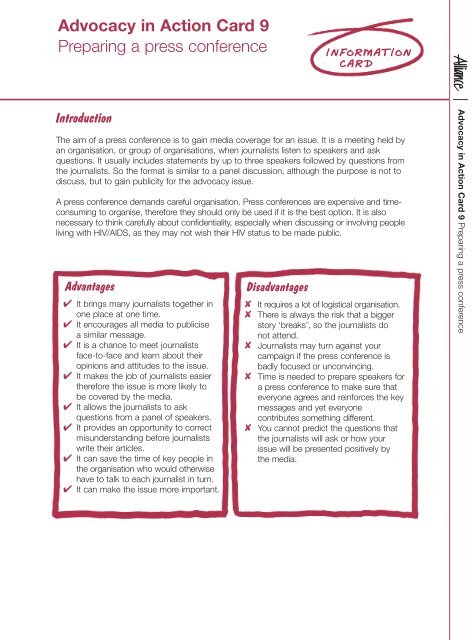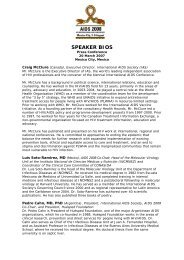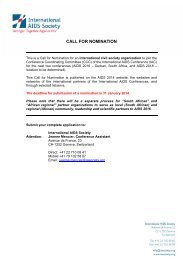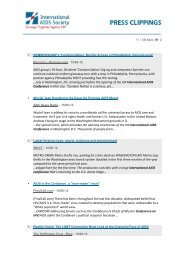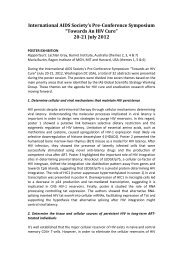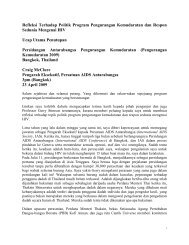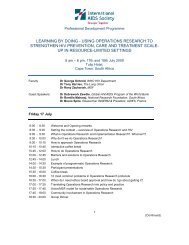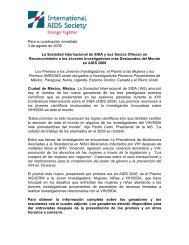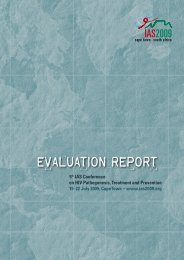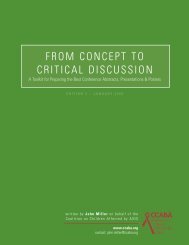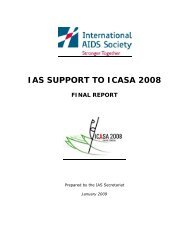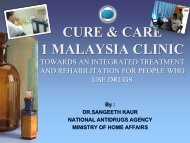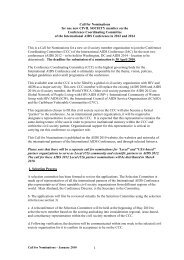Advocacy in Action - International AIDS Society
Advocacy in Action - International AIDS Society
Advocacy in Action - International AIDS Society
Create successful ePaper yourself
Turn your PDF publications into a flip-book with our unique Google optimized e-Paper software.
<strong>Advocacy</strong> <strong>in</strong> <strong>Action</strong> Card 9<br />
Prepar<strong>in</strong>g a press conference<br />
INFORMATION<br />
CARD<br />
Introduction<br />
The aim of a press conference is to ga<strong>in</strong> media coverage for an issue. It is a meet<strong>in</strong>g held by<br />
an organisation, or group of organisations, when journalists listen to speakers and ask<br />
questions. It usually <strong>in</strong>cludes statements by up to three speakers followed by questions from<br />
the journalists. So the format is similar to a panel discussion, although the purpose is not to<br />
discuss, but to ga<strong>in</strong> publicity for the advocacy issue.<br />
A press conference demands careful organisation. Press conferences are expensive and timeconsum<strong>in</strong>g<br />
to organise, therefore they should only be used if it is the best option. It is also<br />
necessary to th<strong>in</strong>k carefully about confidentiality, especially when discuss<strong>in</strong>g or <strong>in</strong>volv<strong>in</strong>g people<br />
liv<strong>in</strong>g with HIV/<strong>AIDS</strong>, as they may not wish their HIV status to be made public.<br />
Advantages<br />
✔ It br<strong>in</strong>gs many journalists together <strong>in</strong><br />
one place at one time.<br />
✔ It encourages all media to publicise<br />
a similar message.<br />
✔ It is a chance to meet journalists<br />
face-to-face and learn about their<br />
op<strong>in</strong>ions and attitudes to the issue.<br />
✔ It makes the job of journalists easier<br />
therefore the issue is more likely to<br />
be covered by the media.<br />
✔ It allows the journalists to ask<br />
questions from a panel of speakers.<br />
✔ It provides an opportunity to correct<br />
misunderstand<strong>in</strong>g before journalists<br />
write their articles.<br />
✔ It can save the time of key people <strong>in</strong><br />
the organisation who would otherwise<br />
have to talk to each journalist <strong>in</strong> turn.<br />
✔ It can make the issue more important.<br />
Disadvantages<br />
✘ It requires a lot of logistical organisation.<br />
✘ There is always the risk that a bigger<br />
story ‘breaks’, so the journalists do<br />
not attend.<br />
✘ Journalists may turn aga<strong>in</strong>st your<br />
campaign if the press conference is<br />
badly focused or unconv<strong>in</strong>c<strong>in</strong>g.<br />
✘ Time is needed to prepare speakers for<br />
a press conference to make sure that<br />
everyone agrees and re<strong>in</strong>forces the key<br />
messages and yet everyone<br />
contributes someth<strong>in</strong>g different.<br />
✘ You cannot predict the questions that<br />
the journalists will ask or how your<br />
issue will be presented positively by<br />
the media.<br />
<strong>Advocacy</strong> <strong>in</strong> <strong>Action</strong> Card 9 Prepar<strong>in</strong>g a press conference


